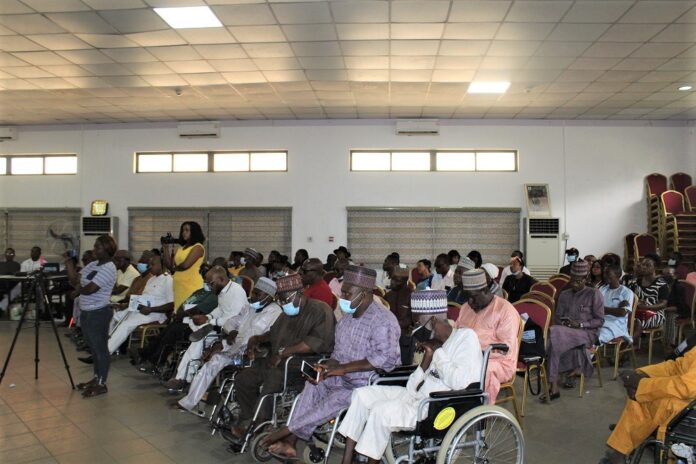The greatest challenge for people with disabilities isn’t the inability to hear speech, to see colours, to use the limbs effectively, or to process information rapidly.
The major problem is society. The challenge is the attitude of people. Individual attitudes affect the environment and institutions. A negative attitude from members of society towards a specific vulnerable group will make the population struggle much more to fulfill their potential.
If we aren’t facing poor accessibilities in jobs, education, or other opportunities, *we are certainly facing bad labeling, discrimination, and contempt.
Inclusion is one of the most famous and widely-used terms around the world today. It has become such a global word. The UN’s Department of Economic and Social Affairs Capacity Building describes social inclusion as “The pledge to “leave no one behind” and to endeavor to reach those furthest behind first is at the heart of the 2030 Agenda for Sustainable Development.
Fresh facts are emerging regarding the ideas and principles of social inclusion. Our century has been marked with words such as inclusion, participation, communication, collaboration, as well as creativity. However, far from being fairly harnessed, the innovative capacities and ingenuities of people, in particular, individuals with disabilities, are unprecedented.
Time after time, Nigeria has struggled to cultivate an attitude and culture that embrace the dignity and equality of persons with exceptionalities.
Yet, systems and institutions have failed to formulate and implement pieces of legislation and policies that include the excluded, provide a voice to the voiceless, and vision to the blindfolded. Across states in Nigeria, the personal, attitudinal, and institutional challenges that are faced by people with disabilities continually mount.
Social inclusion, according to researchers in the field of special education, may be looked at in two distinct ways: personal perspective and public perspective.
Personal perspective holds a subjective view on disability inclusion. Here, Social inclusion is about total acceptance. Social inclusion is about self-conquest. Disability inclusion, as far as the personal perspective is concerned, is about self-assertiveness, in the core of disability or personal circumstances. It denotes ‘knowing’ oneself despite physical, health, or sensory impairment. It means loving oneself and accepting oneself, without boasting and without apologies.
Social inclusion is only humanely possible following acceptance. Only after self-conquest would we feel truly free and included.
Social inclusion comes from the inside.
From the public perspective, Social inclusion is essentially about a culture that embraces tolerance. Disability inclusion, for the disabled, is having an unfettered opportunity to thrive and to maximize one’s potential regardless of sensory or physical impairment. Social inclusion is seeing a government priority tilt to a plane that creates an enabling environment where everyone, regardless of disability can compete and succeed- with order, with fairness, and with justness.
However, over 35 million people with disabilities in Nigeria have grown tired of this mantra “Social Inclusion”. It has somehow graduated into a cliché. People now want to see real things done for real people who are living with disabilities.
We have to take action. And the time to take action is now.
It turns out that government, due to various factors, is unable to step up to the plate and institute a national environment that accommodates every citizen without regard for status or disability. It is on this note that civil societies and nonprofit organizations are enthusiastic about getting things done.
Apart from massive sensitizations to the public about the frameworks and dynamics of disabilities, particular emphasis is placed on the following key areas that improve the overall resources and opportunities of the disabled.
Basic strategies for social inclusion for people with disabilities
There are proven strategies for instituting disability inclusion. Moving away from a charity/welfare model where people with disabilities are seen as dependent with few skills to the facilitation of innovation and investment that creates benefits for both the private sector and people with disabilities;
Mainstreaming disability inclusion by working with DPOs and understanding and addressing the multiple barriers that prevent people with disabilities from active participation in the labour market;
Supporting targeted interventions to specifically focus on barriers people with disabilities face; and filling evidence and data gaps through routine collection and analysis of disaggregated data with regards to people with disability.
Education and Employment
Unemployment rates among persons with disabilities are almost double that of the general population, owing to attitudinal, mobility-related, technological, and physical barriers (lack of accessible workplaces). Assistive devices are expensive and not easily available, which limits mobility and access to technology for persons with disabilities. In addition, many will experience frequent denial of job opportunities, employers’ negative attitudes, inappropriate job placement, lower expectations at work, and a lack of reasonable accommodation.
Over 85% of people with disabilities have no access to quality education. Recent scholastic studies have revealed that there are poor academic performances recorded by students with special needs compared to their non-disabled counterparts. No thanks to the accompanied psychosocial challenges of living with a disability, including depression and emotional imbalances, study habits, poor locus of control, and poor self-esteem, as well as school factors, are troubles that beset students with disabilities.
May it be noted that achieving inclusive economic growth will be challenging without the inclusion of persons with disabilities.
Yet, despite all the suggested initiatives for the population it is difficult to measure the amazing number of efforts that Nigerian government and civil organizations and stakeholders can put together to improve the resources and opportunities of people with disabilities for the sole sake of empowering progression, as well as ensuring Social inclusion in Africa’s most populous nation.
By RAJI ADE OBA


